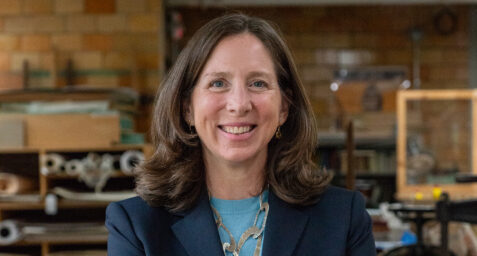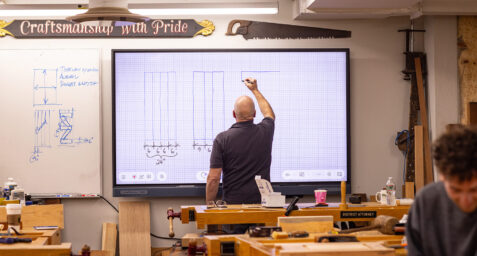Partner in Craft Spotlight: Adams + Beasley Associates
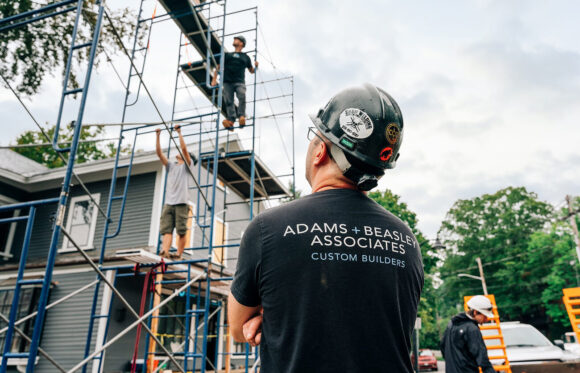
Our Partners in Craft program recognizes corporations and small businesses across industries that support the School.
We spoke with Nick Beasley PC ’03, Director of Production at Adams + Beasley Associates and Preservation Carpentry alumnus, about why Adams + Beasley supports NBSS, trends they’re noticing in their field, advice for graduates, and more.
How did you discover the School?
A friend of mine from college had a friend in the Preservation Carpentry program in 2000 or so. At that point, I was living in Boston and doing IT. I was pretty unhappy working in an office and wanted to get back to working with my hands; maybe architecture, maybe going back into building. And I’ve always loved old houses, and this friend told me about the NBSS program and I thought it sounded amazing. I came out for a tour and decided I had to do it. I had thought about working as a carpenter previously, but I wanted to have better skills. So I thought, I can either go work for somebody and hopefully they do go work, are a good teacher, and want to teach, and I can learn slowly over the years. Or I could do this program and develop my skills fast.
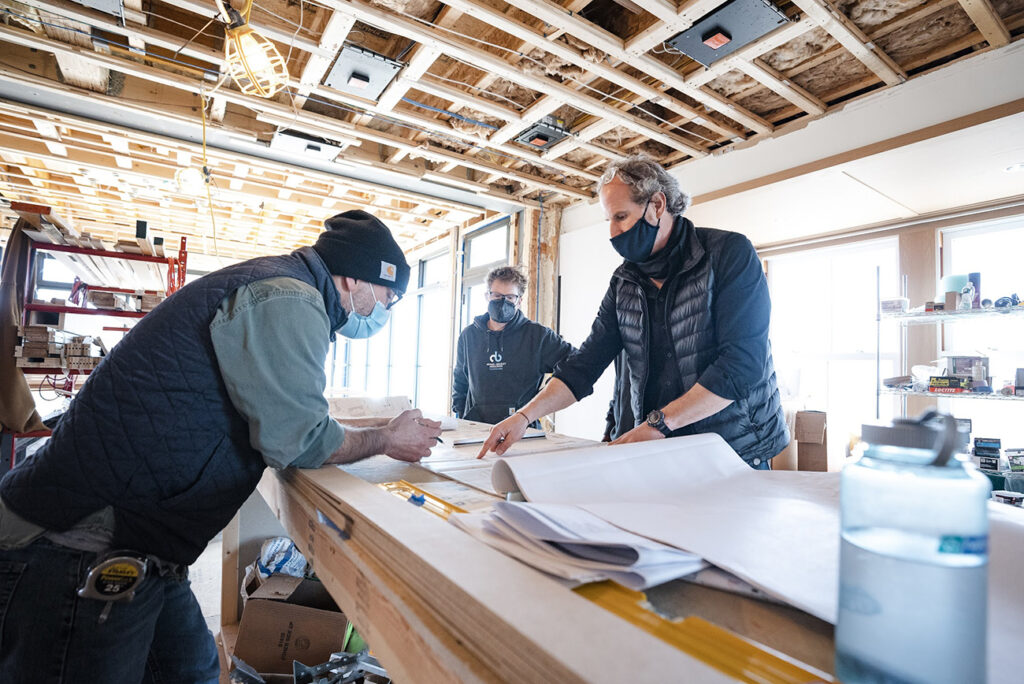
During the summer between the first and second years of the program and then immediately after graduating, I went to work at Essex Restoration with Walter Beebe Center PC ’94, another graduate. But my plan was to start my own company as quickly as I could.
I did that the same year after completing the program with another graduate, starting Beasley and Reidy in 2003. Tom and I worked together until about 2008, and then I shifted to a solo venture as Beasley Custom Builders, with the crew I had. In about 2010, I merged my company with Adams + Beasley, which is run by my brother Angus and Eric Adams, and I’m now their Director of Production.
Why do you support NBSS?

There’s a diminishing talent pool in the industry as a whole, and any place that can continue to develop those trades, and talents, and craftspeople is critical. There are very few places that produce tradespeople like North Bennet Street does, and there are fewer and fewer carpenters that have the skills that NBSS grads do. There’s a real benefit to understanding that the tools we have available to us now make it quicker and faster, but understanding how it was built before, and why they built things that way, makes you a much better builder.
We’ve done our own training and development for our staff, but it’s great to have a resource like North Bennet Street, so we want you to stick around. People who go there are so into the craft—it’s a calling for them. When we look for workers, we look for people who really care about what they’re building and what they’ll leave behind. This can be just a vocation, but for us, it’s more than that. North Bennet attracts those kinds of people, and also puts out those kinds of people.
What has been your experience working with NBSS grads?
We currently have seven NBSS grads working with us now. I love them all. A few were in my class, so I knew them already, and others I met along the way. There’s a confidence in their knowledge and skill set; I know they’re already working at a high level, and we can help get them even further.
They have an interest in and a passion for what we do. It’s a joy to work with them because they care—they really care about doing beautiful work. They aim to leave a legacy of good work behind that will stand the test of time. Not just this year or next year, but in 15 years, a cabinet they installed will still look beautiful. Aesthetics may change, but the craftsmanship is solid. If it’s well built, it’s timeless.
What is an interesting trend in your field you’ve noticed recently?
Well, we joke a lot that riftsawn oak seems to be a big trend right now. To the point where you almost can’t buy it anymore. All millwork seems to have gone that direction.
But industry-wide, there’s an ongoing concern about staffing. Finding good people, skilled people, and young people. There’s general anxiety, and not just in carpentry: plumbers, electricians, HVAC, everybody. People are really worried about that, including us.
Within that is another trend where a lot of companies have shifted to become construction supervisors, which means they don’t have carpenters on staff, they just manage projects. We have 30 carpenters on our staff. We’ve become a place where carpenters want to come because we do our own work. Younger carpenters want to join us because we do a lot of training and skill development, and they see a trajectory where they can be successful and make enough money to have a decent life. We’ve spent a lot of years making sure we pay our people well, above market competitiveness, so this can be a liveable career for them. I feel fortunate that we’ve created that space and built a good reputation.

But that overall concern industry wide of where the next generation is coming from is still there. And also, I’m considering how I quickly get information from my seasoned and experienced top carpenters out of their heads and to the younger people, so they can learn all the tricks and techniques that the veterans have spent years honing, and so that knowledge doesn’t get lost when they retire.
We’re getting excited about the energy efficiency area too, and it’s a fascinating area for the building science field to be heading towards. The code has changed so builders have to be much more energy efficient now. We’ve built a few net zero homes, and it was a really interesting process. Even from the preservation side, techniques in this area can allow us to more completely preserve buildings and save them in ways that might not have been possible before. So we’ve got our eye on how that pans out in the next decade and onward.
I do always have some skepticism about new techniques and technology that aren’t tried and true, though. One of the nice things about going to North Bennet is that I know, if I build things with historic methods, it will last. There’s structures all around us in this area that have been around for 400 years, so they were onto something. And we try new materials and sometimes they work, and sometimes they don’t—which is an expensive experiment for everybody. I think of a fiasco in the early 2000s where there was a new type of siding material they wanted everyone to try, but it basically rotted off every house it was put on. So now we move with caution, get a warranty, and test. If we want to try a new product out, we might build a mock up and see how it weathers over 3-4 years.
“People who go to NBSS are so into the craft—it’s a calling for them. When we look for workers, we look for people who really care about what they’re building and what they’ll leave behind. North Bennet attracts those kinds of people, and also puts out those kinds of people.”
Complete the sentence: If I wasn’t in the building industry, I’d be a _.
Professional surfer? [Laughs], that might be more of a hobby.
If I were to start again, I’d love to build and restore motorcycles. It’s craft-related, working with your hands, mechanical knowledge, etc.
What’s the best thing that you’ve read recently?
Could be a whole book, an article, or any other bit of whimsy, information, or inspiration.
I recently read Radical Candor by Kim Scott, which outlines a business management technique on how to have hard conversations with people. She talks about being honest and truthful, but caring at the same time. You can be a jerk and yell at people, or you can be too nice by not giving people the critical feedback that they really need. And in between those two is radical candor, where you’re being honest but it’s coming from a place of caring. You’re not giving feedback to make them feel bad, you just want them to improve.
I read it because I felt like one of our management weak spots has been those difficult conversations, whether it’s with clients or staff. So it’s something we’re actively training for now. Because, for me, I never knew how to run a business. I know how to build things, but I didn’t have a background in management. And our senior team is now turning our focus from the building side of the business to be more active in the management of the company, which is a whole different challenge. And one of those aspects is having tough conversations. So this book was an interesting read, with a technique I could employ.
What motivates you? And/or what do you love about your work/field?
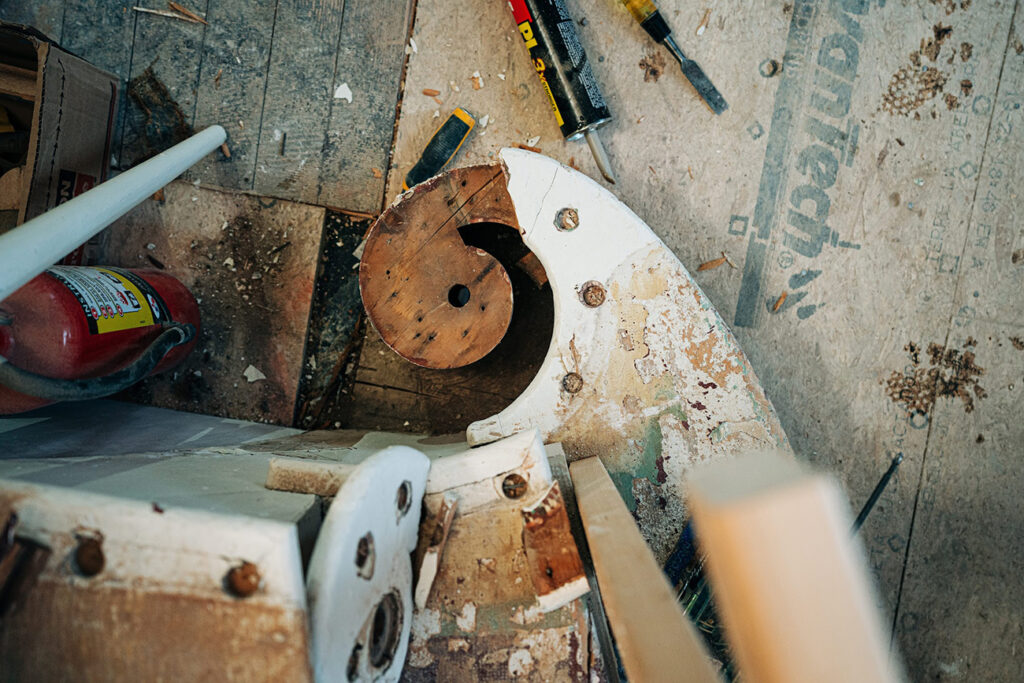
I love the fact that this job is always challenging. Whether it’s building something we’ve never built before, or getting it done in a tight timeline, or discovering something we weren’t expecting and how we’re going to solve it without changing the design completely. My job is problem solving all the time, and I get a lot of juice out of that.
Another obvious one is the people I work with. We’ve worked hard to put together a crew of nice, thoughtful, smart, interested people—including the North Bennet grads. Working with them is just fun. I look forward to going to work everyday with all the people we work with, and the rest of our team does too. They’re feeling successful and fulfilled, which makes me happy.
What life or career advice can you share with our students and graduates?
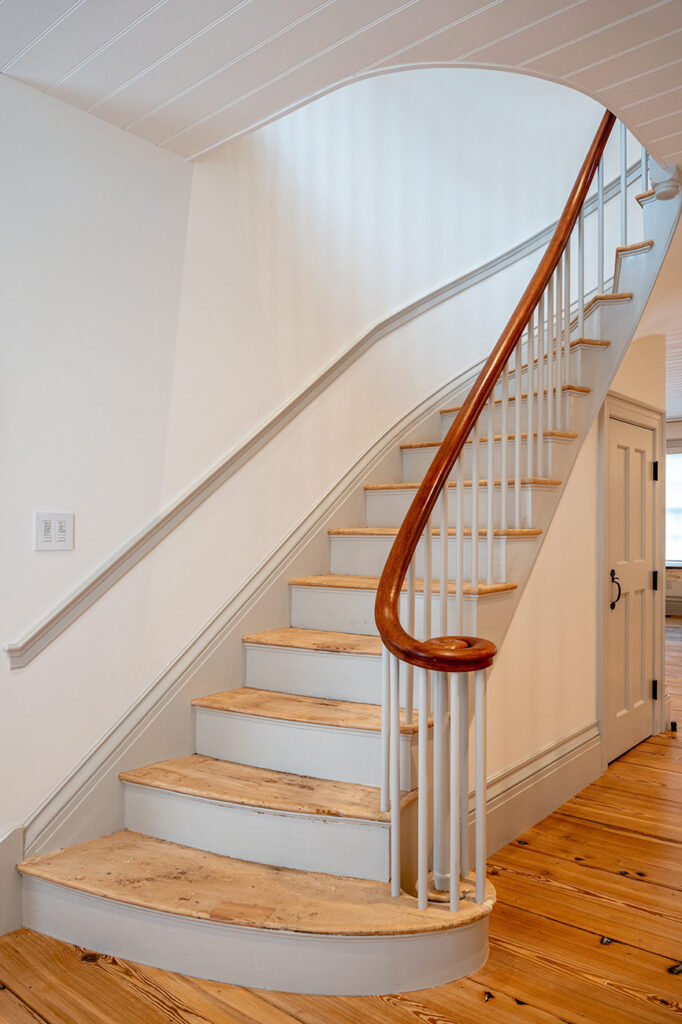
If you’re young, I’d say to spread your wings and try a bunch of things to figure out what you like. If you have figured out what you like, find ways to dig in to that area—that can lead to more satisfaction. If you’re never able to get to what you really want to do, you may not feel excited to go to work everyday.
There’s a lot of opportunities in this industry and there’s a lot of ways you can take the skills you’ve learned at NBSS, and it may not be what you initially thought. I did Preservation Carpentry, and at the end, true preservation wasn’t my calling. But I’m so glad that I did it, and it gave me a great basis to build off of. I tried mill workshops, I tried big new construction, and I had to figure out where I wanted to land.
And work hard. These jobs are hard work, but if you put in the effort, it pays off.
